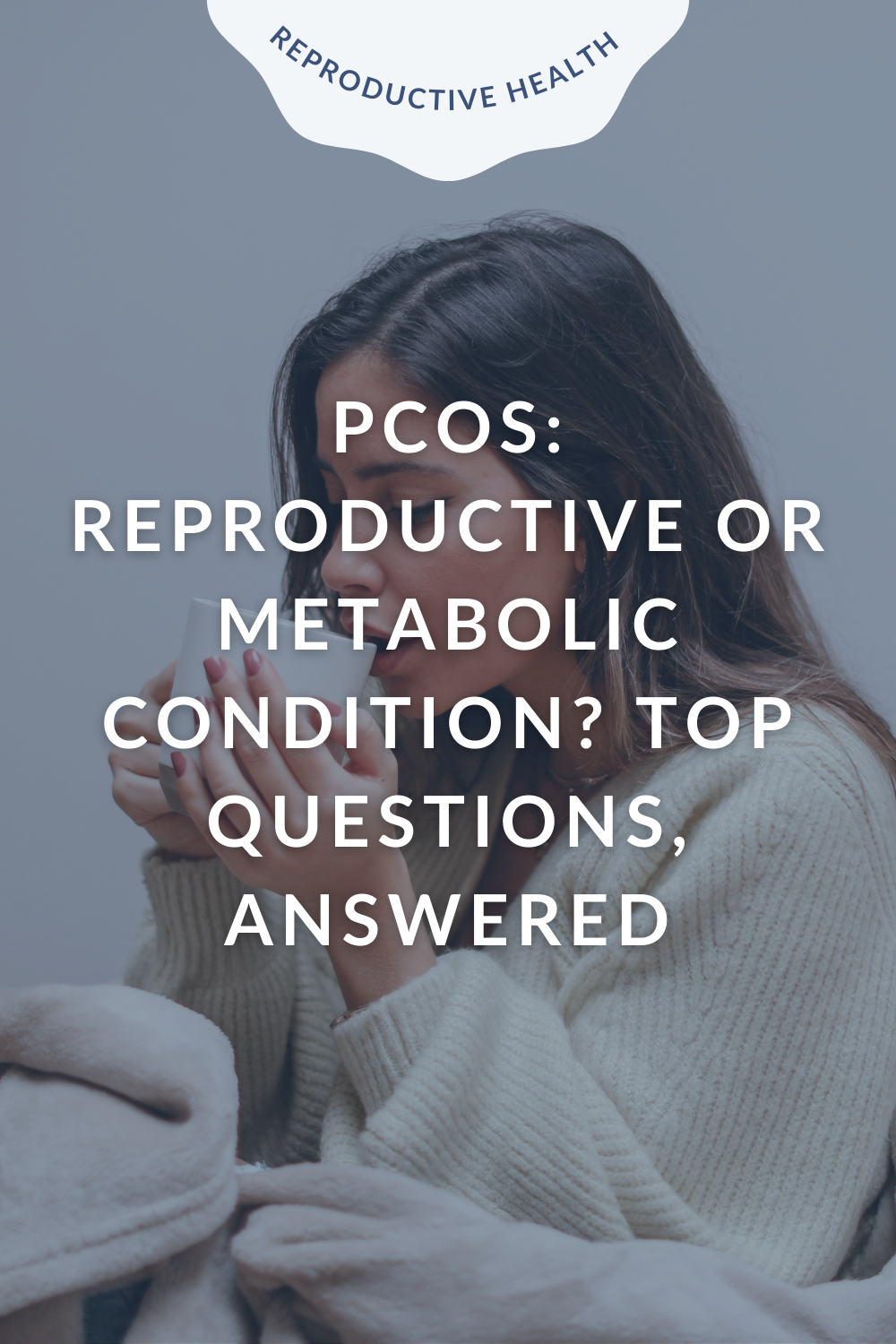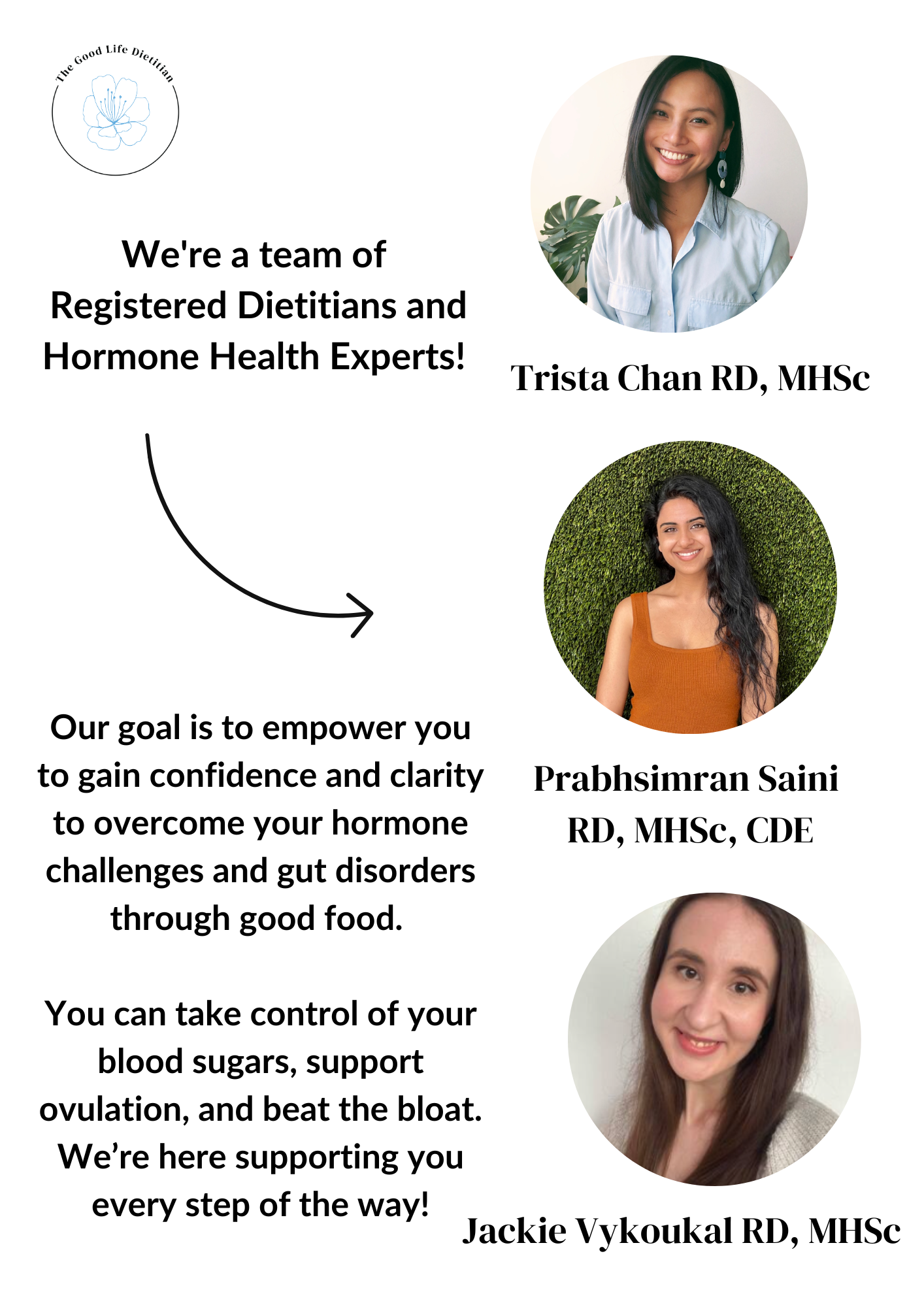PCOS: Reproductive or Metabolic Condition? Top Questions, Answered
Polycystic Ovary Syndrome (PCOS) is often oversimplified as a reproductive disorder, but research and clinical practice show a more complex story.
Some people experience hormonal breakouts and that wired-but-tired feeling that just won’t go away! Others struggle with insulin resistance, metabolic syndrome, and more.
It can feel confusing. That’s why today, I want to break it down: explain what PCOS really is, highlight the latest conversations about renaming this syndrome, and answer the four most common questions in the PCOS Recovery Program community.
PCOS: Hormonal and Metabolic Drivers
PCOS has both metabolic and endocrine (hormonal) features.
A hallmark of PCOS is hyperandrogenism. This can look like hirsutism, acne, irregular cycles androgenic alopecia or show up in blood work.
Additionally, 65-95% of people with PCOS exhibit insulin resistance. This contributes to compensatory hyperinsulinemia, which further exacerbates androgen production and perpetuates the cycle of metabolic and reproductive dysfunction!
Researchers also link PCOS to cortisol dysregulation and chronic low-grade inflammation.
Beyond Fertility: PCOS as a Full-Body Condition
In addition to reproductive and fertility challenges, people with PCOS may experience:
Metabolic disturbances (impaired glucose tolerance, high cholesterol, fatty liver)
Gastrointestinal symptoms (bloating, constipation, reflux)
Dermatological features (acne, seborrhea, alopecia)
Psychological features (body image concerns, anxiety, depression, mood instability)
Importantly, PCOS is also associated with increased long-term health risks, including type 2 diabetes, cardiovascular disease and endometrial cancer (more on this later).
Yet, so often the only advice people are given is “just lose weight” or “go on the pill” or “come back when you want to get pregnant” (this last one is a personal pet peeve)
A New Name for PCOS
Many people find the name PCOS misleading because it emphasizes only ovarian features and overlooks the broader impacts of the condition.
Monash University led a global survey asking over 3400 healthcare professionals and 4200 people with PCOS across six continents about this issue. The results? 86% of people with PCOS and 76% of clinicians agreed that renaming the condition could better reflect its full impact, reduce confusion, and ultimately improve care.
To keep the conversation going, Monash has launched a follow-up survey for both healthcare professionals and patients to weigh in on potential new names.
Next up, we rounded up the most frequently asked questions in our PCOS Recovery Program live coaching calls and daily chat box to give you clear, evidence-based answers on this condition.
Your Top PCOS Questions, Answered:
Why am I gaining weight no matter what I eat?
People with PCOS often gain more weight over their lifetime, but it’s not about “laziness” or overeating. Research suggests diet and exercise habits in people with PCOS aren’t consistently different from those without PCOS. Some studies show more health-promoting habits, some show less and some show no significant difference (and here).
This suggests that it’s likely intrinsic factors (like appetite hormones, metabolism) that may function differently in people with PCOS, while social determinants such as access to care and environment could also contribute (though research is limited).
The takeaway: Weight gain in PCOS is largely body-driven, not effort-driven. People with PCOS are motivated to improve their health; their metabolism and endocrine system may just respond differently!
We support people with PCOS through our PCOS Recovery Program, providing personalized nutrition, lifestyle strategies, and ongoing guidance to help manage symptoms and improve overall health.
Check out this blog on why the “traditional” approach for weight loss may not work with PCOS.
Do I have to take progestin? Can’t I just focus on diet?
Progestin is a synthetic form of progesterone. People with PCOS often have irregular or absent periods, which prevents the uterine lining from shedding. Over time, this increases the risk of endometrial hyperplasia and cancer. Progestin induces periods to protect the uterine lining.
As a dietitian, I see firsthand how nutrition and lifestyle changes can improve cycles and ovulation. I am a HUGE advocate for this.
That said, PCOS is a chronic condition. For many, medication isn’t just an option, it’s necessary. That doesn’t mean all your hard work has gone to waste, it just means that sometimes your body needs extra support. And that’s okay!
Whether your periods occur naturally or with progestin, aim for at least four cycles per year to protect your uterine lining. Holistic care combines lifestyle changes and medical support, which can both be lifesaving.
The takeaway: Supporting ovulation in PCOS often requires both lifestyle strategies and medical guidance. Your efforts with nutrition and habits are impactful, even if medication is needed.
If you want personalized guidance on improving cycles, supporting ovulation, and optimizing hormonal health, our PCOS Recovery Program provides tailored nutrition strategies, lifestyle coaching, and ongoing support to help you manage symptoms and feel your best.
Do I need to go low carb or keto?
Keto or low-carb diets can seem appealing for PCOS because lowering carbs may help reduce blood sugar spikes and hyperinsulinemia. But remember: “low” is relative. Many studies that show benefit use carb intakes are actually within, or just slightly below, Health Canada’s recommended ranges. In my opinion, it's called “low carb” mainly for two reasons:
The typical North American diet tends to be much higher in carbs, so adjusting to the standard recommended ranges are “lowering it”
“Low carb” makes a catchy, easy-to-remember soundbite
A meta-analysis that compared various diets in managing PCOS suggest these macro ranges are effective:
40-55% carbs
15-30% protein
25-40% fat
These numbers are not drastically different from Health Canada’s general recommendations (45-65% carbs, 10-35% protein, 20-35% fat).
I also think we focus too much on carbs. In many studies, “low carb” is paired with “low fat,” which effectively increases protein, or in conjunction with a Mediterranean diet, or in conjunction with a DASH diet, both of which are high in minimally processed foods.
So instead of looking at just carbs, think of the other two macronutrients, overall quality of dietary pattern.
The takeaway: Sustainable PCOS management isn’t about extreme restriction. The key is to consider all macronutrients and overall diet quality, not just carbs.
If you struggle with finding the right carb balance and building meals that support your hormones, our PCOS Recovery Program, helps you create personalized meal strategies, manage insulin resistance, and feel more in control of your nutrition without extreme dieting.
Can I do vigorous exercise with PCOS?
A common myth says high-intensity exercise worsens hormones by spiking cortisol. That’s misleading! Cortisol naturally rises during exercise and then falls afterward.
The real problem is inadequate recovery. Skipping meals, under-fueling, poor sleep, or missing grounding routines can keep cortisol elevated. Recovery and building stress tolerance matter.
A review of 33 studies found that vigorous-intensity exercise may have the greatest impact on cardiorespiratory fitness, body composition and insulin resistance. People with PCOS should aim for at least 120 minutes per week to achieve meaningful health benefits. This is drastically different from what you see online!
Instead of fearing intensity or overthinking the “best” exercise, just start moving! Any type, any intensity. Fuel, rest, and gradually increase intensity. Like nutrition, progress begins with action, not fear.
Avoiding exercise every time you menstruate adds up to roughly three months a year. That’s a big chunk of your reproductive years to stay sedentary. Don’t let fear hold you back.
The takeaway: Vigorous exercise is safe and beneficial for PCOS when paired with proper recovery. Focus on consistent movement, fueling, and rest rather than perfection!
If you want support balancing exercise with proper fueling, recovery, and managing stress, our PCOS Recovery Program provides personalized strategies to help your body handle workouts, optimize hormones, and improve overall health.
The Takeaway
PCOS affects the whole body, not just fertility. Managing it effectively combines nutrition, lifestyle, exercise, recovery, and sometimes medication. Small, personalized changes can improve symptoms and long-term health.
Our PCOS Recovery Program provides tailored guidance and ongoing support to help go from confused and overwhelmed to clear and confident in balancing hormones, managing symptoms, and feeling your best!
Hi! I’m Trista
A Registered Dietitian and reproductive health expert. I’m here to help you gain confidence to overcome your Polycystic Ovary Syndrome and digestive health woes, while bettering your relationship with food.
CATEGORIES
Struggling with painful PCOS symptoms?
In just 12 weeks, our PCOS Recovery Program helps you go from overwhelmed to confident. Learn to understand your body, balance your hormones, and reclaim your energy. Join us!
REFERENCES
Aboeldalyl S, James C, Seyam E, Ibrahim EM, Shawki HE, Amer S. The Role of Chronic Inflammation in Polycystic Ovarian Syndrome-A Systematic Review and Meta-Analysis. Int J Mol Sci. 2021 Mar 8;22(5):2734. doi: 10.3390/ijms22052734. PMID: 33800490; PMCID: PMC7962967.
Álvarez-Blasco F, Luque-Ramírez M, Escobar-Morreale HF. Diet composition and physical activity in overweight and obese premenopausal women with or without polycystic ovary syndrome. Gynecol Endocrinol. 2011 Dec;27(12):978-81. doi: 10.3109/09513590.2011.579658. Epub 2011 May 24. PMID: 21609197.
Benjamin JJ, Kuppusamy M, Koshy T, Kalburgi Narayana M, Ramaswamy P. Cortisol and polycystic ovarian syndrome - a systematic search and meta-analysis of case-control studies. Gynecol Endocrinol. 2021 Nov;37(11):961-967. doi: 10.1080/09513590.2021.1908254. Epub 2021 Apr 5. PMID: 33818258.
Johnson JE, Daley D, Tarta C, Stanciu PI. Risk of endometrial cancer in patients with polycystic ovarian syndrome: A meta‑analysis. Oncol Lett. 2023 Mar 8;25(4):168. doi: 10.3892/ol.2023.13754. PMID: 36960190; PMCID: PMC10028221.
Juhász AE, Stubnya MP, Teutsch B, Gede N, Hegyi P, Nyirády P, Bánhidy F, Ács N, Juhász R. Ranking the dietary interventions by their effectiveness in the management of polycystic ovary syndrome: a systematic review and network meta-analysis. Reprod Health. 2024 Feb 22;21(1):28. doi: 10.1186/s12978-024-01758-5. PMID: 38388374; PMCID: PMC10885527.
Mei S, Ding J, Wang K, Ni Z, Yu J. Mediterranean Diet Combined With a Low-Carbohydrate Dietary Pattern in the Treatment of Overweight Polycystic Ovary Syndrome Patients. Front Nutr. 2022 Apr 4;9:876620. doi: 10.3389/fnut.2022.876620. PMID: 35445067; PMCID: PMC9014200.
Moran LJ, Brown WJ, McNaughton SA, Joham AE, Teede HJ. Weight management practices associated with PCOS and their relationships with diet and physical activity. Hum Reprod. 2017 Mar 1;32(3):669-678. doi: 10.1093/humrep/dew348. PMID: 28069732.
Moran LJ, Ranasinha S, Zoungas S, McNaughton SA, Brown WJ, Teede HJ. The contribution of diet, physical activity and sedentary behaviour to body mass index in women with and without polycystic ovary syndrome. Hum Reprod. 2013 Aug;28(8):2276-83. doi: 10.1093/humrep/det256. Epub 2013 Jun 15. PMID: 23771201.
Noormohammadi M, Eslamian G, Malek S, Shoaibinobarian N, Mirmohammadali SN. The association between fertility diet score and polycystic ovary syndrome: A Case-Control study. Health Care Women Int. 2022 Jan-Mar;43(1-3):70-84. doi: 10.1080/07399332.2021.1886298. Epub 2021 Apr 2. PMID: 33797335.
Patten RK, Boyle RA, Moholdt T, Kiel I, Hopkins WG, Harrison CL, Stepto NK. Exercise Interventions in Polycystic Ovary Syndrome: A Systematic Review and Meta-Analysis. Front Physiol. 2020 Jul 7;11:606. doi: 10.3389/fphys.2020.00606. PMID: 32733258; PMCID: PMC7358428.
Teede HJ, Joham AE, Paul E, Moran LJ, Loxton D, Jolley D, Lombard C. Longitudinal weight gain in women identified with polycystic ovary syndrome: results of an observational study in young women. Obesity (Silver Spring). 2013 Aug;21(8):1526-32. doi: 10.1002/oby.20213. Epub 2013 Jul 2. PMID: 23818329.
Teede, H. J., Moran, L. J., Morman, R., Gibson, M., Dokras, A., Berry, L., Laven, J. S. E., Joham, A., Piltonen, T. T., Costello, M. F., Norman, R. J., & Bahri Khomami, M. (2025). Polycystic ovary syndrome perspectives from patients and health professionals on clinical features, current name, and renaming: A longitudinal international online survey. eClinicalMedicine, 84, 103287. https://doi.org/10.1016/j.eclinm.2025.103287
Zhang X, Zheng Y, Guo Y, Lai Z. The Effect of Low Carbohydrate Diet on Polycystic Ovary Syndrome: A Meta-Analysis of Randomized Controlled Trials. Int J Endocrinol. 2019 Nov 26;2019:4386401. doi: 10.1155/2019/4386401. PMID: 31885557; PMCID: PMC6899277.













